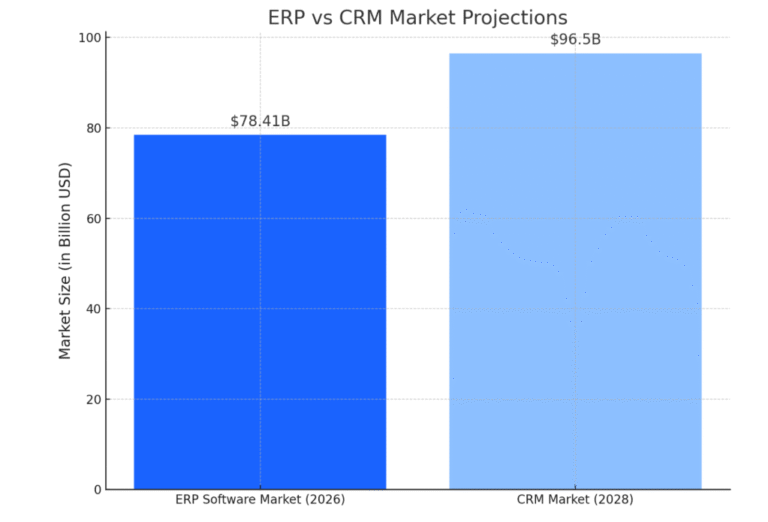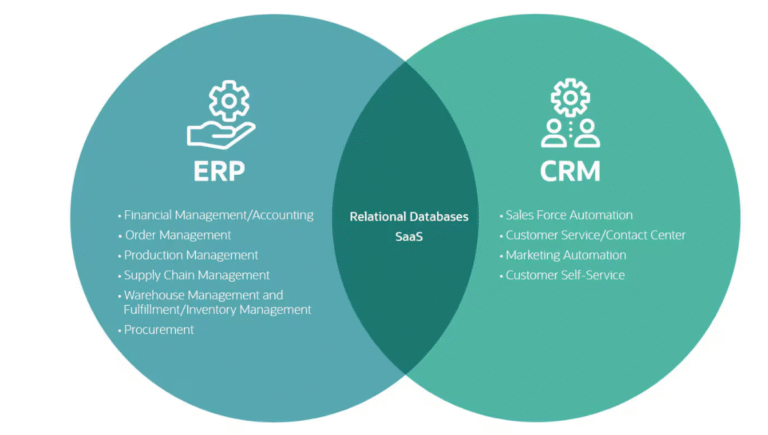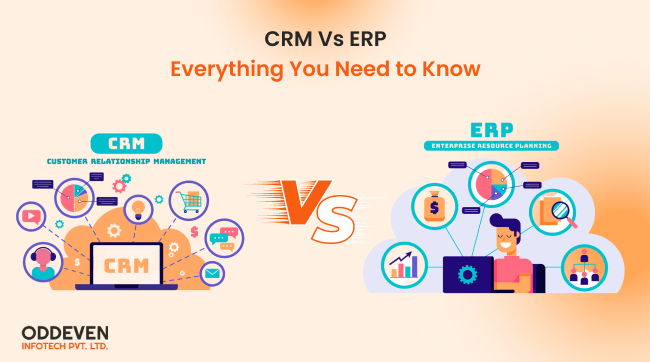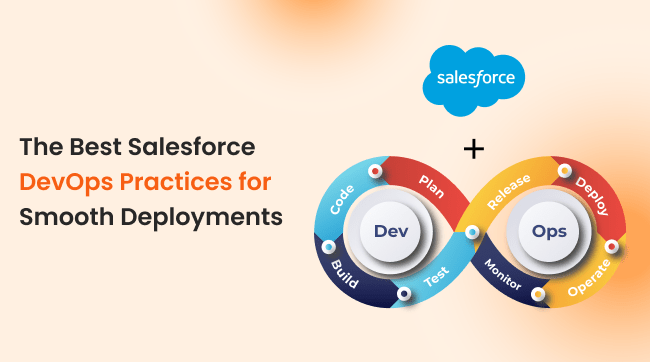Businesses that want to automate their core business processes typically consider two leading software solutions, like ERP and CRM. ERP help them run successful businesses by connecting their operational and financial systems to the central database, while CRM helps them manage how customers interact with their businesses. The ERP market is expected to reach $78.41 billion by 2026, whereas the global CRM market is projected to reach $95.5 billion by the end of 2028.

Both CRM and ERP are crucial data repositories that impact multiple departments. Sometimes they’re built on the same platform, while at other times they’re brought separately and integrated as needed. If you know the ABC of ERP and CRM, it can help you improve your business’s efficiency. In this blog, we will discuss the difference between CRM and ERP and which one is ideal for your business.
So, without further ado, let’s get started.
What is CRM?
CRM stands for Customer Relationship Management. It helps you manage and analyze your interactions with customers, identify sales opportunities, and build better relationships to increase customer retention and loyalty.
What is ERP?
The full form of ERP is Enterprise Resource Planning. It links large-scale business operations, including supply chain management, HR, manufacturing, accounting, and inventory management. It is your company’s backbone which ensures each process works appropriately, data flows smoothly, and everything falls into the piece.
Why Do You Need to Understand the Difference Between CRM and ERP?
It is important that you understand whether or not your organization needs CRM and ERP, or may need both. If you don’t understand what each solution can bring to the table, it means wasted resources and lost opportunities.
So, you must understand which system works well in alignment with your business. ERP works on improving the operation process, while CRM offers improved customer retention and engagement.
When you choose the right system, it will provide scalable solutions for better business growth. Therefore, it is essential that you clearly understand your business goal. It will help you decide whether you need a CRM or an ERP.
Core Differences Between ERP and CRM
ERP is your company’s operational brain, whereas CRM acts as the heart of customer interactions.
Here are some key features of CRM vs ERP
CRM is all about customers. It helps you understand, manage, and improve your interactions with your existing and potential clients. So, no opportunity will be wasted.
- CRM helps you track leads and revenue forecasts, as well as optimize your sales pipeline.
- It also enables marketing automation by running targeted campaigns, monitoring performance, and developing customer journeys.
- CRM provides prompt responses to inquiries and efficient resolution of issues.
- Its analytics and reporting tool enables you to track customer behaviour, analyze sales data, and generate actionable insights.
Let’s check out some key features of ERP.
- The ERP system integrates and simplifies your inward-bound business aspects. It makes all the operational processes flawless.
- It helps you do financial management easily by managing targets easily via accounting, budgeting, and tracking cash inflows and outflows.
- The ERP system keeps supply chain management intact.
- You can set up workflow automation using the ERP system and schedule activities to increase production with lessened downtimes.
- You can reduce your pain of payroll management, the recruitment process, and organize your employee’s essential data.

Pros and Cons Of ERP System
Advantages
Improved processes across all departments as it combines big business functions like finance, HR, and supply chain in one place.
ERP solutions minimizes redundancy and errors linked with manual entry and using multiple disconnected tools. It improves accuracy and allows access to the data at the right time.
As ERP gives you real-time insights into the business’s functions, it lets you make more informed decisions.
Disadvantages
Its cost is high as its customization, implementation, and licensing are expensive.
Its implementation is time-consuming and depends on your company’s size and complexity level; its full implementation takes months or years.
You and your team need extensive training to get used to the ERP system.
Pros and Cons of CRM System
Advantages
It offers improved customer satisfaction as this system’s main focus is on centralized customer information and providing efficient customer support by responding to clients’ queries and issues faster.
CRM software lets marketers keep track of customer behavior, segment the audience, and automate routine tasks like follow-up on emails and scheduling. So, you can do data-driven marketing, which will save you a lot of time.
CRM connects the sales and marketing departments by providing them access to similar information. So, it makes the simplified alignment of marketing and sales.
Disadvantages
CRM depends on the data entered into it. So, if the CRM is poorly filled out or has inaccurate data leads, it can be the reason for a poor marketing strategy and lost sales.
If employees find CRM irrelevant to daily tasks or bulky, they will not adopt it. So, for the better utilization of this system, you must train your employees.
Integration with other applications like ERP or other marketing tools is quite resource-intensive. So, poorly integrated applications can result in fragmented data and less effective systems.
Final Thoughts
In a nutshell, both CRM and ERP are powerful business solutions developed to address different business management issues. Which one to choose for your business is depends on your goal, budget, and business size and complexity.
Choose CRM if
- Your main goal is to achieve customer engagement and build better customer relationships.
- If you’re on a tight budget
- You’re a small business owner
Choose ERP if
- The primary goal is to achieve operational efficiency through automation and simplification of internal processes.
- You’re on a tight budget but can afford a lightweight ERP.
Choose ERP-CRM if
- You want to achieve customer engagement and operational efficiency.
- You have an extensive budget to invest in a full-scale ERP-CRM
- You’re a large organization
Therefore, understand each solution and select the one that best suits your requirements. If you’re looking for the best company that develops custom CRM solutions, contact us today. We help in creating a solution that improves productivity by increasing customer satisfaction while assuring a sustainable environment.




